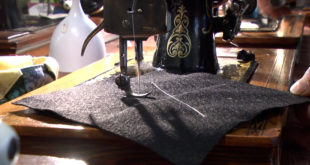 LANSING — State Representative Scott Dianda (D-Calumet) took part in a ceremony today commemorating Cora Reynolds Anderson, Michigan’s first female and first Native American state representative, who represented Baraga, Iron, Keweenaw and Ontonagon counties from 1925-26. The building that houses the Michigan House of Representative legislative offices and committee rooms takes its name from her, and a portrait commemorating Anderson was unveiled at the ceremony today.
LANSING — State Representative Scott Dianda (D-Calumet) took part in a ceremony today commemorating Cora Reynolds Anderson, Michigan’s first female and first Native American state representative, who represented Baraga, Iron, Keweenaw and Ontonagon counties from 1925-26. The building that houses the Michigan House of Representative legislative offices and committee rooms takes its name from her, and a portrait commemorating Anderson was unveiled at the ceremony today.
“Cora Anderson led the way for other women and Native Americans in Michigan who sought to take an active role in leading their communities,” Rep. Dianda said. “At a time when opportunities for women and for Native Americans were limited, she had the determination to become a strong leader for her community anyway. She exemplified the hardworking, can-do spirit I see around the 110th House District to this day, and it is an honor to help share her story with the rest of the state.”
Anderson won an election to the state House in 1924, just four years after women’s suffrage became a Constitutional right. Born in L’Anse in 1882 and a member of the Ojibwe tribe, she earned a teacher’s diploma and taught at the Zeba Mission in L’Anse and at Skanee. She was active in the fight to bring about prohibition, ran an anti-tuberculosis campaign in L’Anse and worked to procure Baraga County’s first public health nurse. Along with her husband, Charles, she ran the Thomas Hotel in L’Anse for a short while before buying and working a 160-acre farm.
In the Legislature, Anderson chaired the Committee for the State Industrial School for Girls, a reform school for young women located in Adrian. She was also a member of the Agriculture, Insurance, and Northern State Normal School committees (the Northern State Normal School would become Northern Michigan University). She introduced six bills that covered a broad range of topics, including licensing for beauticians and cosmetologists, sanitary conditions in hotels and inns, fishing rights, and accounting and reporting in township offices.
“Anderson’s example teaches us how to be actively engaged in our communities and how to serve our neighbors,” Rep. Dianda said. “Our state is lucky to have had leaders like Anderson, and her portrait in the House office building named for her will serve to remind my colleagues and I about the kind of public servants we should strive to be.”
 Keweenaw Report Your Source for Local News and Sports
Keweenaw Report Your Source for Local News and Sports





